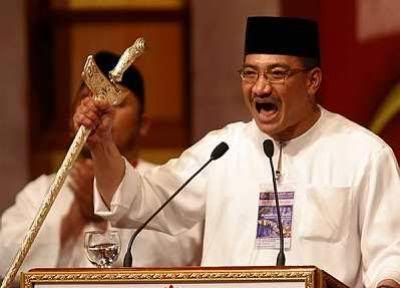Quote:
"...The merit of democracy is that we get to choose our leaders, in contrast to a monarchy where the leadership in inherited. With the choice and competition of democracy we should expect better quality leaders.
Yet in the person of Raja Nazrin we have a hereditary leader who is way ABOVE our elected political leaders.
We could NOT attribute the difference to education. (In) comparing UMNO Youth leaders like Hishammuddin and Khairy Jamaluddin to the Raja Muda, consider this. The pair attended top British universities, as did Raja Nazrin. Khairy, for example, went to Oxford and came back to marry the prime minister’s daughter in lavish multiple ceremonies that dragged on for days. There was nothing modest or simple about that wedding. Raja Nazrin too was Oxford educated, but he opted for a modest uncomplicated ceremony, and asked that donations be given to charity in lieu of extravagant tributes and bodek advertisements in the media.
Nor could we explain the difference to their upbringing or breeding. Hishammuddin is the scion of a distinguished political family. His grandfather, Datuk Onn Jaafar, was ahead of his generation in seeking integration among the races and the creation of a pluralistic vibrant Malaysian nation.
The challenge for Malaysians is how to encourage the Raja Nazrins and dissuade the Hishammuddins among our leaders. Picking our leaders based on their political or familial pedigree is NOT reliable, as demonstrated by Hishammuddin.
Sending future leaders to august universities like Oxford is NO guarantee either. As with Khairy, that would only feed their over-inflated ego and sense of competence. "
-Dr. Bakri Musa
It is the mark of great leaders that they are able to read their followers well, and then to inspire them by appealing to their better side. Raja Nazrin Shah, the Raja Muda of Perak, is not yet a sultan, yet he has excelled on both counts.
His recent royal wedding to Zara Salim Davidson was elegant in its simplicity, and dignified by its moderation. Simplicity and moderation did not make the ceremony any less regal; on the contrary, they enhanced it.
We were, for instance, thankfully spared the all too-common debasing of our fine cultural tradition of the mas kahwin and wang hantaran (dowries) into a crass exchange of cold cash.
In a culture where the elite has difficulty differentiating between the public treasury and private coffer, the prince’s declining to accept public funding for his wedding is unprecedented.
The fact that he is receiving widespread praises and adulations reflects the underlying silent disgust Malaysians have for the rampant and obscenely ostentatious displays of wealth that is fast becoming the norm among our elite.
Only our Malaysian politeness prevents the citizens from expressing their loathing for such vulgar displays and the assault on our collective sensibilities. Unfortunately, our leaders mistake that to be tacit approval, if not explicit encouragement. How wrong can they be!
A few months earlier, the Crown Prince gave a speech where he passionately declared, “Malaysians of all races, religions, and geographic locations need to believe beyond a shadow of a doubt that they have a place under the Malaysian sun.” (Read here speech by Raja Nazrin)
He was specifically addressing young Malaysians, but his speech inspired all. It was without doubt the most widely quoted address. That was remarkable. It was as if Malaysians were yearning for their leaders to say something sensible, and at last they found one who did.
In style, tone and words, his speech was a refreshing contrast to the usual screaming, race taunting, and keris-wielding antics of those who have pretensions to be our next leaders. While Raja Nazrin appeals to the finer qualities of our fellow citizens, these other leaders derive their strength by instigating their followers’ sinister side. Raja Muda’s speech touched our hearts; these other leaders’ rhetoric chilled our spines.
Hereditary and Political Leaders
The merit of democracy is that we get to choose our leaders, in contrast to a monarchy where the leadership in inherited. With the choice and competition of democracy we should expect better quality leaders. Yet in the person of Raja Nazrin we have a hereditary leader who is way above our elected political leaders.
We could NOT attribute the difference to education.
At the risk of flattering UMNO Youth leaders like Hishammuddin and Khairy Jamaluddin by comparing them to the Raja Muda, consider this. The pair attended top British universities, as did Raja Nazrin. Khairy, for example, went to Oxford and came back to marry the prime minister’s daughter in lavish multiple ceremonies that dragged on for days. There was nothing modest or simple about that wedding.
Raja Nazrin too was Oxford educated, but he opted for a modest uncomplicated ceremony, and asked that donations be given to charity in lieu of extravagant tributes and bodek advertisements in the media.
Nor could we explain the difference to their upbringing or breeding.
Hishammuddin is the scion of a distinguished political family. His grandfather, Datuk Onn Jaafar, was ahead of his generation in seeking integration among the races and the creation of a pluralistic vibrant Malaysian nation. Onn resigned from UMNO’s Presidency over this very issue.
Hishammuddin’s father, Hussein Onn, was noted for his integrity and intolerance of corruption. Despite intense opposition and at a considerable cost to his popularity, Hussein refused to block the prosecution for corruption of a popular senior UMNO figure. Unfortunately, none of these sterling qualities filtered down to Hishammuddin.
Demonstrating Good and Upright Leadership
In his speech, the Raja Muda emphasised that “good and upright leadership must be demonstrated.” He was echoing the qadharat hassanah - leadership through personal example - of our Prophet Muhammad, s.a.w.
When the Raja Muda declared that he wanted a modest ceremony, he meant it. He politely declined public funds and asked that the money be expended on the poor instead. The royal wedding guests included students and orphans. In so doing, he inspired others to do the same.
All too often our leaders are good only at spouting trite phrases. “Work with me, not for me!” is an oft-repeated quote of Prime Minster Abdullah.
Yet, when the citizens were in dire need; as during the massive Johore flood; he saw no need to cancel his scheduled overseas vacation. He asked Malaysians to be frugal yet would not hesitate in buying a luxurious corporate jet at public expense for his use. Never mind that no other Commonwealth Prime Minister has such a privilege.
He compares himself to the Saudi King and the United States President. The humility and modesty of a modern Imam!
When the Raja Muda said that political, social and economic incentives must reward good behavior and penalize bad, I wished our Prime Minister would listen. Consider Klang Town Council member Zakaria Mat Deros and “Close One Eye” Melaka MP Muhammad Said. Far from being punished, they are being rewarded, and rewarded handsomely. That sends precisely the wrong message, and undercuts the Prime Minister’s very message (and campaign promise) of public integrity.
Encouraging the Raja Nazrins and discouraging the Hishammuddins
The challenge for Malaysians is how to encourage the Raja Nazrins and dissuade the Hishammuddins among our leaders. Picking our leaders based on their political or familial pedigree is not reliable, as demonstrated by Hishammuddin. Sending future leaders to august universities like Oxford is no guarantee either. As with Khairy, that would only feed their over-inflated ego and sense of competence.
Instead, what we should do is heed the advice of Razja Nazrin - that is, reward our leaders when they do good, and penalise them severely when they stray. Our ultimate weapon as citizens in a democratic society is to grant or deny them our approval at election times. Elections, however, come once every four or five years, and the election weapon is a crude one: approve or reject. There is no subtlety.
There is much that we can do in between elections to voice disapproval of our leaders.
The obvious is of course to let these leaders know when they do something we disapprove. With the democratising effect of the Internet, any citizen can now have a potentially powerful megaphone to reach as wide an audience as possible. The worse that we could do is to justify their stupidities or be their apologists. That would only encourage them. If we do nothing but remain silent on the sidelines, our leaders would eagerly interpret that as approval. They would then continue to act with impunity and become, in the word of my kampong folks, tak sedar ekor (lit. not knowing where his tail is; fig. get carried away). Alternatively, when they do something worthy of our approval, we should be generous in our praises.
I read a deeper meaning to the Raja Muda’s refusal to accept public funding for his wedding.
He is a genuine prince, and his marriage is the product of true love. Like us, he knows that the flattering public displays of devotions and tributes in those effusive newspaper advertisements are phoney.
There was nothing generous in the Mentri Besar offering money that is not his to the prince.
Unlike our political leaders, The Raja Muda intuitively knew that the path to the citizens’ hearts is not to have them spend money on him but for him to spend money on the citizens.
As Raja Nazrin Shah and Zara Salim Davidson begin their life together, I join millions of others in wishing them many years of blissful marriage. May they bring happiness to each other, and may Allah shower His Mercy and Blessings upon them. May their example of charity, grace and moderation rub off on all of us - leaders and followers alike.


No comments:
Post a Comment